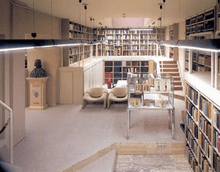Bibliotheca Philosophica Hermetica

The Bibliotheca Philosophica Hermetica or J. R. Ritman Library is a private Dutch library founded by Joost Ritman. The Bibliotheca Philosophica Hermetica brings together manuscripts and printed works in the field of Hermeticism, more specifically the 'Christian-Hermetic' tradition. It is located on the Bloemgracht in the center of Amsterdam.
The library
The Bibliotheca Philosophica Hermetica was founded in 1984 by Joost Ritman and is not linked to any public organisation or library. The Bibliotheca does co-operate with international libraries and organizations, such as the Russian Rudomino Library for Foreign Literature in Moscow, the Herzog August Bibliothek in Wolfenbüttel, the Biblioteca Medicea Laurenziana in Florence, and the Biblioteca Marciana in Venice.
To date, the library holds more than 23,000 volumes on Rosicrucianism, alchemy, mysticism and western esotericism, and has great scientific and artistic value. There are ca. 4,500 manuscripts and books printed before 1800, and ca. 17,000 books (primary and secondary sources) printed after 1800.[1] Among the treasures of the Bibliotheca Philosophica Hermetica are the Corpus Hermeticum published in 1471, the first illustrated edition of Dante's La Divina Commedia from 1481, and Cicero's "De officiis" printed in 1465.
History
Ritman financed his art collection through his corporation 'De Ster' (The Star), that produced plastic tableware. Between 1976 and 1992 Ritman spent 95 million guilders on art objects. The ING Group allowed this until the first Gulf war in 1993. The bank intervened and the art collection was about to be sold by Christie's in London. The Dutch government did not want the collection to be dismantled and gave it the status of "protected National heritage". This ensured that sale abroad was not immediately possible.
Thus ING could not immediately sell the collection but had to go to court. The judge ruled that the collection could be sold. Ritman in return organised an international protest, because he feared that his collection would be ruined if it was sold to different buyers. Amongst the advocates to protect the collection was Umberto Eco. This held off the auction for some time. In 2000 Ritman sold his company to a Swedish company for 500 million guilders. With the revenues he obtained his entire collection back from ING.
On the advice of the Dutch Council for Culture, the Dutch State in 2005 acquired a cross section of the rare books and manuscripts of the Bibliotheca Philosophica Hermetica. The purchase concerns 25 Books of Hours from the Northern Netherlands, 359 manuscripts after 1500, 44 incunables and 3,961 printed books before 1800 (in all 4,389 works). The State paid almost 19 million euro for the works. The works acquired by the State remained in the Bibliotheca until 2010.
In November 2010, Friesland Bank seized the library following a financial conflict with Ritman. The illuminated Rochefoucauld Grail was sent for sale at Sotheby's in London in December 2010 to raise money. On December 13th, 2010, the Dutch newspaper Trouw reported that the State had removed its share of the collection to the National Library of the Netherlands in The Hague for safe keeping.[2] Ritman reopened the library doors to the public on December 16th, 2011. The state-owned portion of the collection remains in the Royal Library.[3]
See also
References
- ↑ The Ritman Library Website. Retrieved: 01-19-2012
- ↑ Dutchnews nl
- ↑ Wouter Hanegraaff. Per Aspera ad Fontes. December 19th, 2011. The Ritman Library Website. Retrieved: 01-19-2012
External links
- Bibliotheca Philosophica Hermetica
- Youtube Chanel of The Ritman Library
- Joost Ritman en de bevrijding van zijn bibliotheek
Coordinates: 52°22′27″N 4°52′56″E / 52.3743°N 4.8822°E